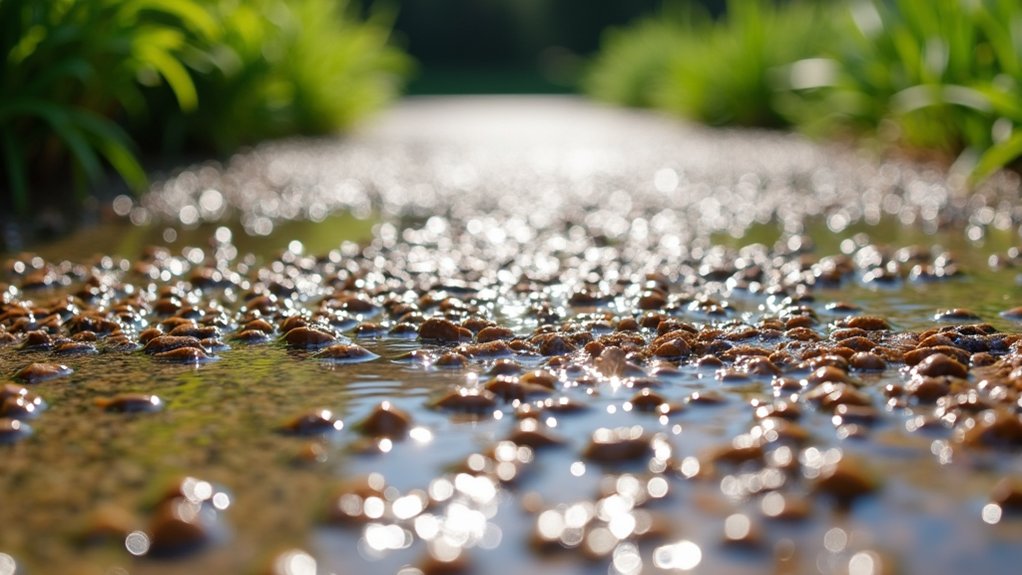Resin-bound gravel tackles drainage issues head-on by letting rainwater seep naturally through its porous surface. Think of it as a giant sieve for your driveway or path – water flows straight through rather than pooling on top. This clever system meets all SuDS regulations whilst being tough enough to handle everything from family cars to delivery vans.
Built to withstand British weather, the surface maintains its water-managing properties year-round, helping replenish underground water supplies naturally. Unlike traditional paving, it prevents localised flooding during heavy downpours – particularly useful for areas prone to water logging.
The practical benefits extend beyond drainage. It’s low-maintenance, looks smart and proves cost-effective over time. For homeowners dealing with puddle-prone driveways or businesses seeking SuDS-compliant surfacing, resin-bound gravel offers a reliable solution.
Key Takeaways
Resin-bound gravel is brilliant for managing Britain’s rainy weather. The surface acts like a giant sponge, letting rainwater seep through naturally instead of forming puddles – much like how your garden lawn absorbs rainfall.
The system filters water as it passes through, catching dirt and pollutants before they reach local streams and rivers. Think of it as nature’s own water filter.
When properly laid, these surfaces cope remarkably well with our British climate. You won’t see the flooding or water build-up that’s common with concrete or tarmac driveways.
The system ticks all the boxes for UK drainage regulations (SuDS), making it ideal for urban areas where water management is crucial.
Unlike traditional surfaces that can crack and lose effectiveness over time, resin-bound gravel stays tough against our weather. It keeps draining efficiently year after year, with minimal fuss and upkeep needed.
Benefits of Permeable Surfaces
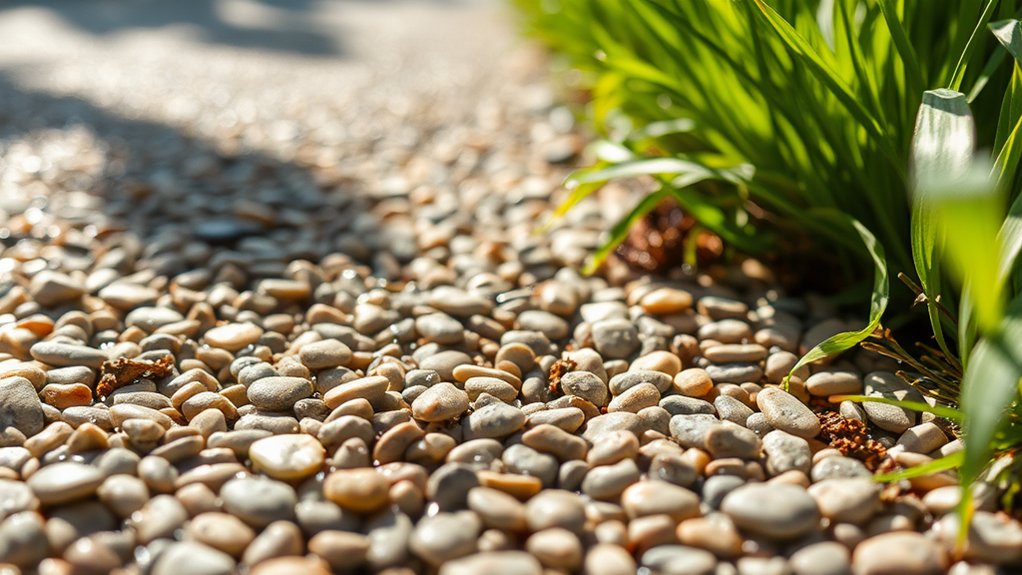
Permeable surfaces offer key benefits for managing rainwater in UK communities. These surfaces let water seep through rather than run off, helping restore natural water patterns in the ground.
They’re particularly effective during heavy British rainfall, reducing local flooding and protecting streams from erosion. This is because permeable paving allows water to infiltrate, recharging groundwater resources and supporting Sustainable Urban Drainage Systems (SuDS).
The environmental gains are significant. As water filters through these surfaces, pollutants from roads and pavements are naturally removed, keeping our waterways cleaner. They help top up groundwater levels, which is vital for maintaining water supplies across the country.
In winter, these surfaces need less gritting, making them more environmentally friendly than traditional paving.
From car parks to garden paths, permeable surfaces provide practical solutions for sustainable drainage, making them an increasingly popular choice for UK developments.
They’re a smart investment in both environmental protection and flood prevention.
Structural Advantages for Effective Drainage
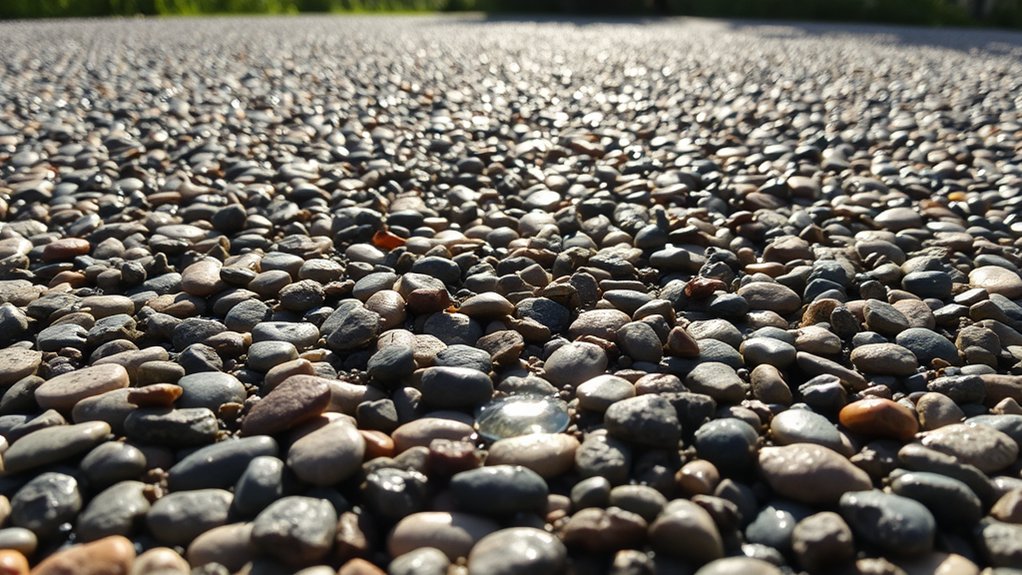
A resin-bound gravel system offers robust drainage whilst bearing heavy loads from vehicles and foot traffic. The surface stays stable in all weather conditions, preventing erosion and allowing rainwater to drain naturally through its permeable structure. This permeability ensures that the system is SUDS compliant, effectively managing surface water and reducing flooding risks. Unlike traditional paving, it needs minimal upkeep – a simple sweep and occasional pressure wash keeps it performing well year-round. Permeable surfaces are perfect for British weather, as they handle everything from summer downpours to winter frost without cracking or lifting.
Load-Bearing Capacity Benefits
Load-bearing capacity is crucial for resin-bound gravel surfaces, determining how well they hold up over time. The right foundation ensures proper weight distribution, whether it’s supporting family cars on a driveway or lorries in a car park. Properly installed resin surfaces can support up to 7.5 tonnes of weight, making them suitable for various vehicular traffic. Moreover, achieving a solid base requires meticulous ground preparation to prevent future structural issues.
| Base Material | Load-Bearing Capacity |
|---|---|
| C20 Concrete | High strength for heavy vehicles |
| EcoGrid System | Up to 800 tonnes per m² |
| Porous Concrete | Combines drainage and strength |
| Recycled Materials | Sustainable with adequate capacity |
Different projects need different load-bearing strengths:
- Home driveways typically need to handle family cars and small vans
- Commercial car parks must withstand constant traffic from heavier vehicles
- Industrial areas require the highest capacity for lorries and machinery
A qualified installer can assess your specific requirements and recommend the most suitable foundation for your project.
Weather Resistance Features
Resin-bound gravel systems excel at handling British weather whilst maintaining their structural strength and drainage properties.
The weather-resistant qualities make them ideal for our varied climate, from summer heat to winter frost.
Key features:
- Temperature Range: Works well in typical UK temperatures (5°C to 25°C)
- Winter-Proof: Handles frost and ice without cracking – much like how a good winter tyre grips the road
- Sun-Resistant: Built-in UV protection stops the surface from fading or turning yellow
- Natural Movement: Flexes with temperature changes, similar to how railway tracks have expansion gaps
These qualities mean your resin-bound surface stays strong and functional year-round, making it a practical choice for British driveways and paths.
The system keeps draining efficiently through heavy rain and maintains its look despite the elements.
Low Maintenance Requirements
Resin-bound gravel stands out for its minimal maintenance needs, thanks to its clever design. The surface lets rainwater pass through easily, much like a natural filter, which stops puddles from forming and cuts down on the need for extra drainage work.
Think of it as a giant sponge that helps water return to the ground naturally – brilliant for British weather! To get the best results, installers should create a perfectly level surface, which means less dirt gets trapped and you won’t need to clean it as often.
The system works particularly well with the right sub-base, making it a sound investment for UK properties. It’s a practical, green option that won’t eat up your weekends with endless maintenance – ideal for busy homeowners and public spaces alike.
Environmental Impact and Sustainability

Environmental Benefits of Resin-Bound Surfaces
Resin-bound gravel surfaces offer significant environmental advantages, primarily through their natural drainage capabilities. The permeable surface allows rainwater to soak through naturally, reducing flood risks common to British weather conditions.
Key environmental benefits:
- Local Materials: UK-sourced stone and aggregates cut transport emissions whilst supporting regional suppliers.
- Recycled Content: The mix often includes recycled glass and plastic waste from British recycling programmes.
- Garden-Friendly: Works around existing trees and plants, helping maintain garden wildlife and insects.
- Temperature Control: Natural drainage creates a cooling effect through water evaporation, particularly useful in built-up urban areas.
The system proves particularly effective for British driveways and paths, where managing rainfall and protecting local ecosystems are constant concerns.
Installation Requirements for Optimal Performance
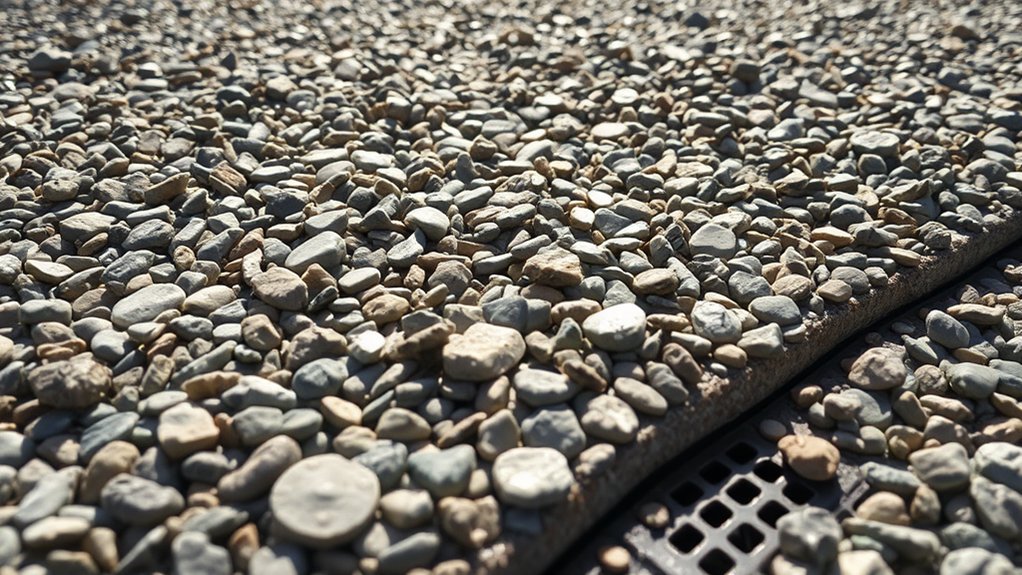
Proper installation of resin-bound gravel demands careful attention to two key factors: a solid sub-base and correct curing.
Think of the sub-base as the foundation of your house – it must be thoroughly compacted and stable to prevent sinking or movement.
The curing process is equally crucial; rushing it would be like walking on freshly laid concrete.
For best results, ensure your contractor follows UK industry standards for base preparation and allows the recommended 6-8 hours curing time in dry conditions.
Cutting corners on either aspect will likely lead to cracks and loose stones down the line.
Sub-Base Preparation Importance
Sub-base preparation makes or breaks a resin-bound gravel surface.
Get it right, and you’ll have a solid, long-lasting installation.
Get it wrong, and you’ll face costly repairs down the line.
Key steps for proper sub-base work:
- Choose the Right Material: MOT Type 3 or open-graded tarmacadam work best for UK conditions.
- Mind Your Depths: Layer should be at least 100mm thick, properly compacted to stop any future sinking.
- Get the Mix Right: Use varied aggregate sizes – it packs better and helps water drain through.
- Sort the Drainage: Ensure it’s SuDS compliant and water can flow freely – crucial for British weather.
A properly prepared sub-base means fewer headaches later.
Think of it as the foundation of your house – skimp on it, and everything above suffers.
Curing Time Considerations
Resin-bound Gravel: Curing Times
Getting the curing time right is vital for a properly set resin-bound surface. Weather plays a significant role in how quickly your surface will be ready for use.
| Stage | Wait Time |
|---|---|
| Safe to Walk On | 6-8 hours |
| Cars and Vehicles | 24-36 hours |
| Completely Cured | 36 hours |
| Cold Weather | 48+ hours |
| Wet Weather | Takes longer |
Best results come from installing in dry conditions with temperatures between 5°C and 30°C – think British spring or autumn days. Avoid rainy weather during installation, as it’ll weaken the surface and slow down the curing process. Think of it like waiting for paint to dry – you wouldn’t want anyone walking on it too soon.
Cost Considerations and Long-Term Savings
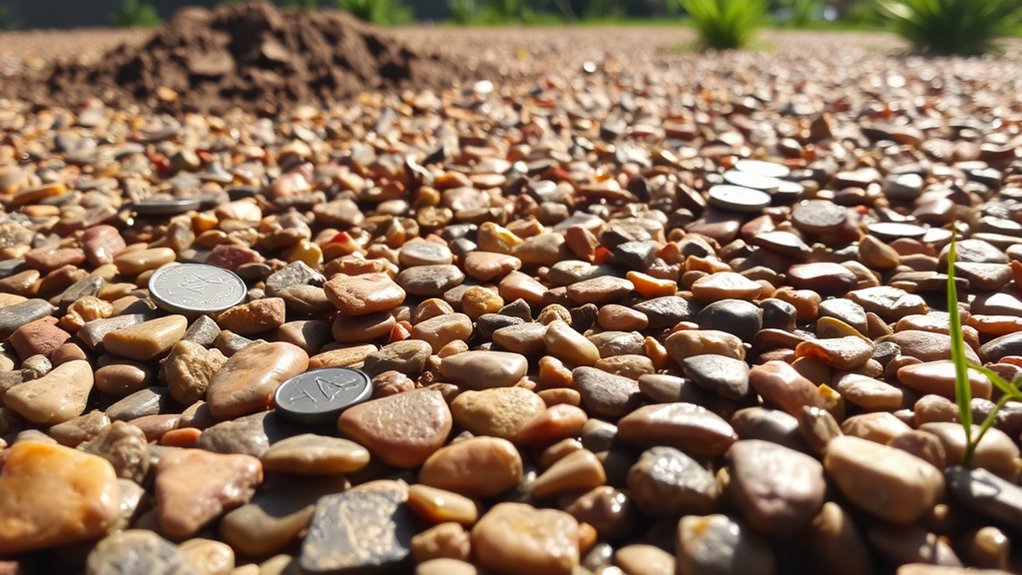
The Initial Investment and Future Benefits of Resin Driveways
Whilst resin-bound gravel driveways command higher upfront costs of £85-£130 per square metre, they deliver substantial long-term value.
Consider these key financial advantages:
- Durability: Exceptionally long-lasting, with minimal repair costs over 15-20 years
- Low Maintenance: No annual sealing or frequent repairs needed, unlike tarmac or block paving
- Weather-Proof: UV-stable materials prevent fading and cracking common in British weather
- Added Value: Smart kerb appeal that can boost your property’s market value
The higher initial cost typically pays for itself through reduced maintenance and increased home value – particularly relevant in the UK property market where outdoor aesthetics matter significantly.
Design Flexibility and Customization Options
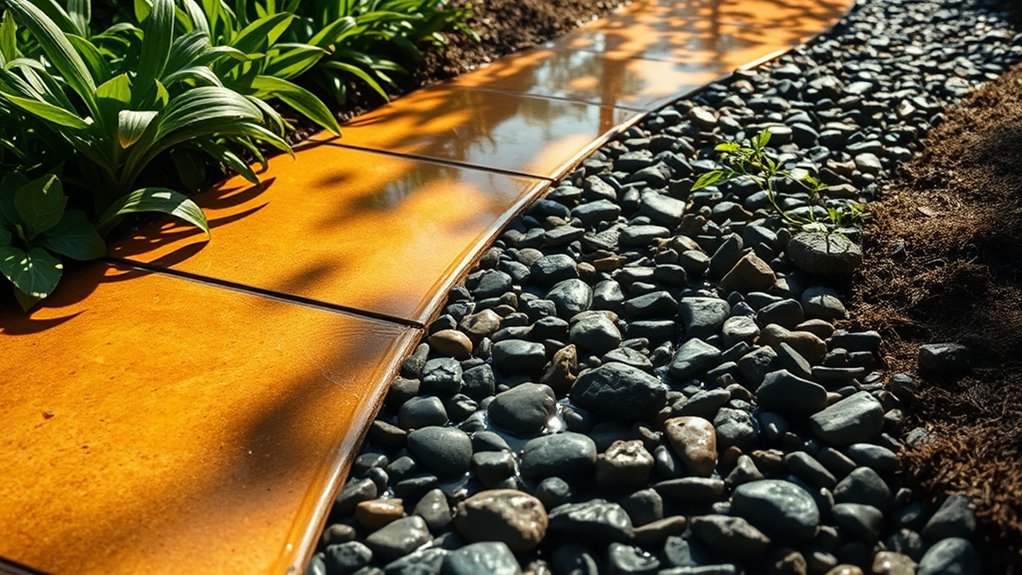
Resin-bound gravel stands out for its remarkable design flexibility and customisation options.
It comes in a vast range of colours and aggregate choices, perfect for matching any garden or driveway style. You might opt for small, smooth stones for a modern patio or larger, textured aggregates for a traditional driveway – the choice is yours.
The system allows for striking patterns and borders, ideal for creating unique looks that complement your property. Want extra grip for sloped areas? Anti-skid finishes are available.
Whether you’re after a contemporary look for your London townhouse or a rustic finish for your countryside home, resin-bound gravel adapts brilliantly to suit your needs.
Maintenance and Repair Insights

Resin-bound Gravel: Care and Upkeep
Proper maintenance of resin-bound gravel keeps it looking smart whilst ensuring it drains effectively. Regular checks and simple upkeep make all the difference:
- Regular Checks: Give your surface a quick once-over monthly – look for leaves, dirt or anything that shouldn’t be there.
- Clear Away Debris: A thorough sweep each fortnight stops leaves and twigs from settling in. Think of it like hoovering your carpet – regular sweeping prevents lasting damage.
- Annual Clean: Use a pressure washer on a gentle setting once yearly, much like washing your car – too much pressure will damage the surface.
- Tackle Weeds Early: Spot-treat any weeds with garden-safe weedkiller before they take hold. Keep an eye out for moss, particularly in shaded areas.
If maintained properly, a resin-bound surface can last 15-20 years – about the same as a well-kept patio or driveway.
Frequently Asked Questions
Can Resin-Bound Gravel Be Installed in Winter Conditions?
Resin-bound gravel installation is possible during winter, though cold weather affects the resin’s curing time. UK winters demand extra care – the base must be properly prepared, dry and frost-free. For best results in British conditions, monitor moisture levels and consider hiring a professional installer who understands cold-weather application techniques.
How Does Resin-Bound Gravel Compare to Permeable Concrete?
Resin-bound gravel functions like a garden sponge, proving more effective than permeable concrete at handling British weather. It drains better, looks smarter with more colour options, and takes less faff to install – all whilst keeping rainwater properly managed through its porous surface.
Is Resin-Bound Gravel Suitable for Regions With Heavy Snowfall?
Resin-bound gravel works well in snowy regions, thanks to its porous nature that helps prevent ice build-up. The surface remains stable in freezing temperatures, and when the snow melts, the water drains through rather than forming dangerous puddles. Think of it like a winter-ready jumper – tough enough to handle the cold whilst keeping you protected. Particularly suitable for British winters, where frequent freeze-thaw cycles can wreak havoc on standard driveways.
Can I Install Resin-Bound Gravel Myself?
Installing resin-bound gravel as a DIY project is possible, but requires careful attention to detail. Ensure you’ve properly prepared the base layer, stick precisely to the resin mixing ratios, and work quickly as the mixture sets fast. With proper planning and preparation, you can achieve professional-looking results on your driveway or garden path.
What Is the Lifespan of Resin-Bound Gravel Surfaces?
Resin-bound gravel surfaces last between 15 and 25 years when properly maintained. Regular upkeep and high-quality materials are vital for maximising their lifespan – much like caring for a car. With proper cleaning and maintenance, these surfaces remain durable and attractive for decades.
Conclusion
Resin-bound gravel offers excellent drainage capabilities whilst adding value to your property. The permeable surface efficiently manages rainwater, reducing the risk of flooding and surface water build-up common to British weather. It’s practical, long-lasting and requires little upkeep compared to traditional surfaces. The system works particularly well for driveways and paths, where proper drainage is essential year-round. When you consider the British climate, this practical solution makes solid sense for both residential and commercial properties.
